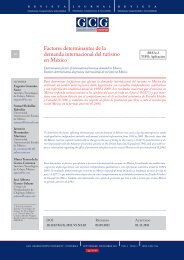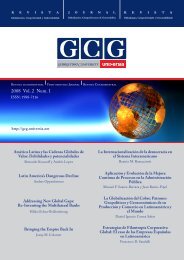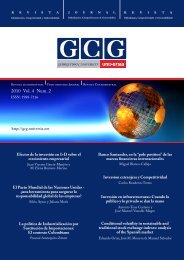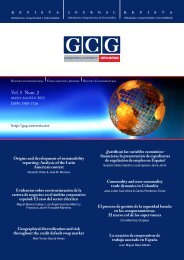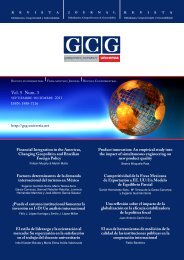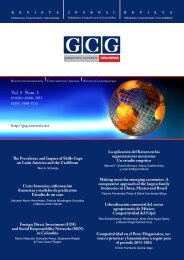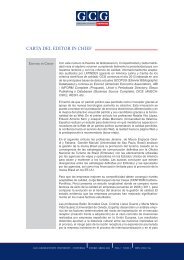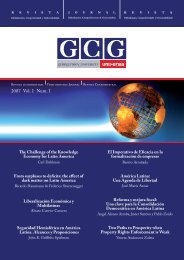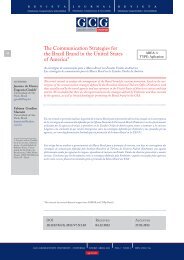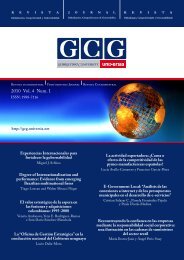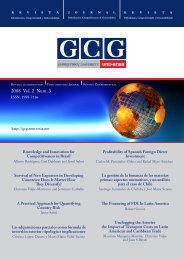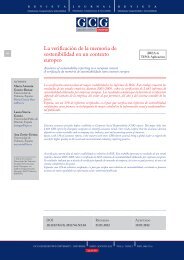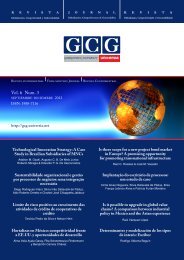Vol. 6 Num. 1 - GCG: Revista de Globalización, Competitividad y ...
Vol. 6 Num. 1 - GCG: Revista de Globalización, Competitividad y ...
Vol. 6 Num. 1 - GCG: Revista de Globalización, Competitividad y ...
You also want an ePaper? Increase the reach of your titles
YUMPU automatically turns print PDFs into web optimized ePapers that Google loves.
Promote China-Latin American Relations in the 21 st Century1103. Demands for Improving China-Latin American RelationshipsThe 21 st century provi<strong>de</strong>s prospects for both China and Latin America to materialize theirrelationship. A changing global context, domestic changes in China and Latin Americancountries, and China’s foreign policy position towards Latin America and the Caribbean inthe 21 st century contribute to the <strong>de</strong>mand for the improvement of the China-Latin Americarelationship in the new millennium.The 21 st -century world continues its major transformations in several fundamental ways.Some basic features can be observed as they are unfolding in the new millennium. First, withthe changes and adjustments of the world un<strong>de</strong>rway, peace and <strong>de</strong>velopment continue tobe mainstreams of this present age, though there are still regional/local conflicts and violencethat occur around the world. Second, a trend toward multipolarity in the world is irreversible,and economic globalization is gaining momentum. And third, it is in the fundamentalinterests of all nations to share in the historical moment of <strong>de</strong>velopment by addressing theircommon challenges while promoting the noble cause of constructing a harmonious worldof human peace and stability. It can be reasonably argued that global peace and economic<strong>de</strong>velopment in the 21 st century offer both opportunities and challenges, which <strong>de</strong>mand that<strong>de</strong>veloping countries like China and the Latin American countries to cooperate and coordinatemore closely.Domestic <strong>de</strong>velopment in both China and Latin American countries encourages the <strong>de</strong>sirefor improving the China-Latin America relationship. China has repeated its <strong>de</strong>termination tostick to the direction of its economic, social, and political reforms. This implies that Chinahas chosen the route of <strong>de</strong>velopment as its national agenda. Many countries in Latin Americaalso seek to push forward their economic growth and social progresses. China and manyLatin American countries have ma<strong>de</strong> national <strong>de</strong>velopment a top priority. Other shared i<strong>de</strong>ntitiesalso encourage both China and Latin American countries to seek closer relationshipswith each other. As one commenter puts it, the shared <strong>de</strong>veloping country i<strong>de</strong>ntities, similarhistorical experiences, and common <strong>de</strong>sires for peace are the “political bases” of improvingChina-Latin America relations (Cheng, 2006:3).In terms of its foreign policy in the new millennium, China maintains and pursues cooperativeapproaches to international affairs. As one of the ascendant powers in the world, Chinareiterates its commitment to the path of peaceful <strong>de</strong>velopment and the win-win strategy incontinuing its path of opening up to the outsi<strong>de</strong> world. It also reaffirms its cooperation andfriendship with all countries on the basis of the Five Principles of Peaceful Coexistence, inthe hope that the social construction of a harmonious world of durable peace and commonprosperity can be ma<strong>de</strong> possible.Within this context, China’s foreign policy in the early 21 st century has begun to attachgreater importance to, and seek closer relationships with, the Latin American countries.Latin America has a long history of splendid civilizations with vast territories and abundantresources, and enjoys a good foundation for economic growth and social progress as wellas huge <strong>de</strong>velopment potentials. For Chinese foreign policy <strong>de</strong>icisonmakers, Latin Americancountries constitute important parts of the <strong>de</strong>veloping world and major forces that areplaying increasingly important roles in regional and international affairs, contributing signifi-<strong>GCG</strong> GEORGETOWN UNIVERSITY - UNIVERSIA ENERO-ABRIL 2012 VOL. 6 NUM. 1 ISSN: 1988-7116pp: 107-114



